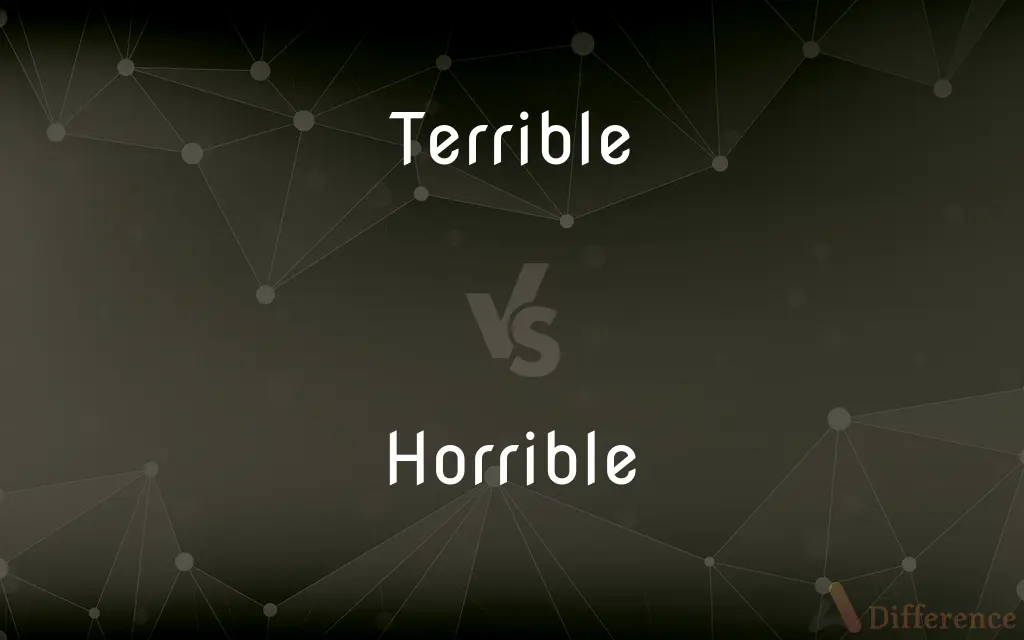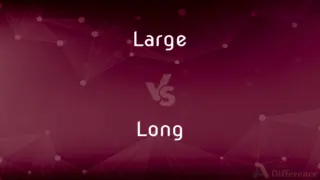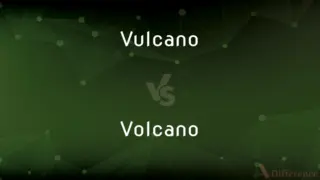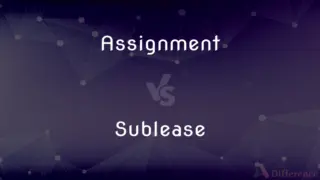Terrible vs. Horrible — What's the Difference?
Edited by Tayyaba Rehman — By Maham Liaqat — Updated on March 11, 2024
Terrible often implies an extreme level of fear or discomfort, while horrible suggests disgust or repulsion.

Difference Between Terrible and Horrible
Table of Contents
ADVERTISEMENT
Key Differences
Terrible is frequently used to describe something that causes fear, shock, or extreme discomfort, emphasizing the severity of a situation or the strong negative emotions it elicits. Horrible, on the other hand, often conveys a sense of revulsion or disgust, pointing to the unpleasantness or offensive nature of something.
In terms of intensity, terrible might be used to express a higher degree of emotional or physical distress, suggesting that something is not just bad but profoundly unsettling. Horrible, while also indicating something very negative, tends to lean more towards things that are repugnant or that induce a strong sense of disgust rather than fear.
The contexts in which terrible and horrible are used can overlap, but "terrible" is often applied to situations, outcomes, or feelings, such as a terrible accident or feeling terrible about a mistake. "Horrible," meanwhile, is more likely to describe conditions, tastes, smells, or sights, like horrible weather or a horrible smell.
In literature and speech, terrible is sometimes preferred to convey the magnitude of a disaster or a deeply negative emotional state. Horrible might be chosen to highlight the ghastly or gruesome details of a scene or situation, emphasizing the sensory aspects that provoke disgust.
The historical and literary uses of these words can differ. "Terrible" has been used in contexts to denote awe-inspiring fear or respect, such as Ivan the Terrible, whereas "horrible" has traditionally been linked with horror stories or tales designed to elicit revulsion or fear of the gruesome.
ADVERTISEMENT
Comparison Chart
Primary Emotion
Fear, extreme discomfort
Disgust, revulsion
Intensity
High emotional or physical distress
Strong sense of disgust
Common Uses
Situations, feelings, outcomes
Conditions, tastes, smells, sights
Literary Connotation
Magnitude of disaster, negative emotions
Ghastly, gruesome details
Historical/Literary Usage
Awe-inspiring fear, respect
Horror, revulsion
Compare with Definitions
Terrible
Very serious or severe.
She made a terrible mistake.
Horrible
Extremely bad in quality.
His performance was simply horrible.
Terrible
Causing great fear or alarm.
The legend speaks of a terrible monster in the woods.
Horrible
Frightful, dreadful.
The conditions in the old building were horrible.
Terrible
Extremely distressing or severe.
The storm caused terrible damage.
Horrible
Very unpleasant or bad.
The soup had a horrible taste.
Terrible
Inspiring awe or fear.
The power of the natural world is both beautiful and terrible.
Horrible
Revolting, repulsive.
The movie depicted a horrible war scene.
Terrible
Very bad in quality or degree.
He has a terrible sense of direction.
Horrible
Causing or likely to cause horror; shocking.
They discovered a horrible crime scene.
Terrible
Causing great fear or alarm; dreadful
A terrible bolt of lightning.
A terrible curse.
Horrible
Horrible is an EP by the rock group Half Japanese. It was released in 1982.
Terrible
Extremely formidable
Terrible responsibilities.
Horrible
Arousing or tending to arouse horror; dreadful
"War is beyond all words horrible" (Winston S. Churchill).
Terrible
Extreme in extent or degree; intense
"the life for which he had paid so terrible a price" (Leslie Fiedler).
Horrible
Very unpleasant; disagreeable.
Terrible
Unpleasant; disagreeable
Had a terrible time at the party.
Terrible food.
Horrible
A thing that causes horror; a terrifying thing, particularly a prospective bad consequence asserted as likely to result from an act.
Terrible
Very bad
A terrible actor.
Horrible
A person wearing a comic or grotesque costume in a parade of horribles.
Terrible
Dreadful; causing terror, alarm and fear; awesome
The witch laid a terrible curse on him.
Horrible
Causing horror; terrible; shocking.
Terrible
Formidable, powerful.
Horrible
Tremendously bad.
Terrible
Intense; extreme in degree or extent.
He paid a terrible price for his life of drinking.
Horrible
Exciting, or tending to excite, horror or fear; dreadful; terrible; shocking; hideous; as, a horrible sight; a horrible story; a horrible murder.
A dungeon horrible on all sides round.
Terrible
Unpleasant; disagreeable.
The food was terrible, but it was free.
Horrible
Provoking horror;
An atrocious automobile accident
A frightful crime of decapitation
An alarming, even horrifying, picture
War is beyond all words horrible
An ugly wound
Terrible
Very bad; lousy.
Whatever he thinks, he is a terrible driver.
Terrible
In a terrible way; to a terrible extent; terribly; awfully.
Terrible
Adapted or likely to excite terror, awe, or dread; dreadful; formidable.
Prudent in peace, and terrible in war.
Thou shalt not be affrighted at them; for the Lord thy God is among you, a mighty God and terrible.
Terrible
Excessive; extreme; severe.
The terrible coldness of the season.
Terrible
Causing fear or dread or terror;
The awful war
An awful risk
Dire news
A career or vengeance so direful that London was shocked
The dread presence of the headmaster
Polio is no longer the dreaded disease it once was
A dreadful storm
A fearful howling
Horrendous explosions shook the city
A terrible curse
Terrible
Exceptionally bad or displeasing;
Atrocious taste
Abominable workmanship
An awful voice
Dreadful manners
A painful performance
Terrible handwriting
An unspeakable odor came sweeping into the room
Terrible
Intensely or extremely bad or unpleasant in degree or quality;
Severe pain
A severe case of flu
A terrible cough
Under wicked fire from the enemy's guns
A wicked cough
Terrible
Extremely distressing;
Fearful slum conditions
A frightful mistake
Suffered terrible thirst
Common Curiosities
Can terrible and horrible be used interchangeably?
While they can be used in similar contexts, their nuanced differences in connotation mean they are not always interchangeable.
What is the key difference between terrible and horrible?
Terrible often emphasizes fear or extreme discomfort, while horrible suggests disgust or repulsion.
Can something be both terrible and horrible?
Yes, in many contexts, especially if it elicits both fear and disgust.
How do the uses of terrible and horrible differ in literature?
Terrible is often used to convey the magnitude of a disaster or negative emotions, whereas horrible emphasizes gruesome or ghastly details.
How do personal perceptions affect the use of terrible and horrible?
Individual experiences and cultural backgrounds can influence how these words are interpreted and chosen.
Is terrible or horrible a stronger word?
This depends on context; terrible may imply greater emotional or physical distress, while horrible might suggest something is profoundly repugnant.
Are there any genres where terrible and horrible are particularly prevalent?
Both words are frequently used in horror and tragedy genres, each serving to elicit specific emotional responses.
Does terrible have a positive connotation in any context?
Historically, "terrible" could imply awe-inspiring fear or respect, though this use is less common today.
Is horrible always related to senses like taste and smell?
Horrible is commonly used for sensory displeasures, but it also applies to broader situations of disgust or shock.
Are there any synonyms that capture both terrible and horrible?
Words like "dreadful" or "appalling" can encompass aspects of both, depending on context.
How have the meanings of terrible and horrible evolved over time?
While their core meanings have remained relatively stable, their usage and connotations may shift with cultural and linguistic trends.
Is there a difference in severity between terrible and horrible weather?
This can be subjective; "terrible" might emphasize dangerous or extreme conditions, while "horrible" could focus on discomfort and unpleasantness.
Can the context of a situation determine whether terrible or horrible is more appropriate?
Yes, the specific details and emotional impact of a situation can guide the choice between these words.
Can the distinction between terrible and horrible influence storytelling?
Yes, choosing between them can affect the tone, emphasis, and emotional impact of a narrative.
How do cultural expressions influence the use of terrible vs. horrible?
Cultural narratives and expressions can shape which word is deemed more appropriate in certain contexts or for certain audiences.
Share Your Discovery

Previous Comparison
Large vs. Long
Next Comparison
Vulcano vs. VolcanoAuthor Spotlight
Written by
Maham LiaqatEdited by
Tayyaba RehmanTayyaba Rehman is a distinguished writer, currently serving as a primary contributor to askdifference.com. As a researcher in semantics and etymology, Tayyaba's passion for the complexity of languages and their distinctions has found a perfect home on the platform. Tayyaba delves into the intricacies of language, distinguishing between commonly confused words and phrases, thereby providing clarity for readers worldwide.















































